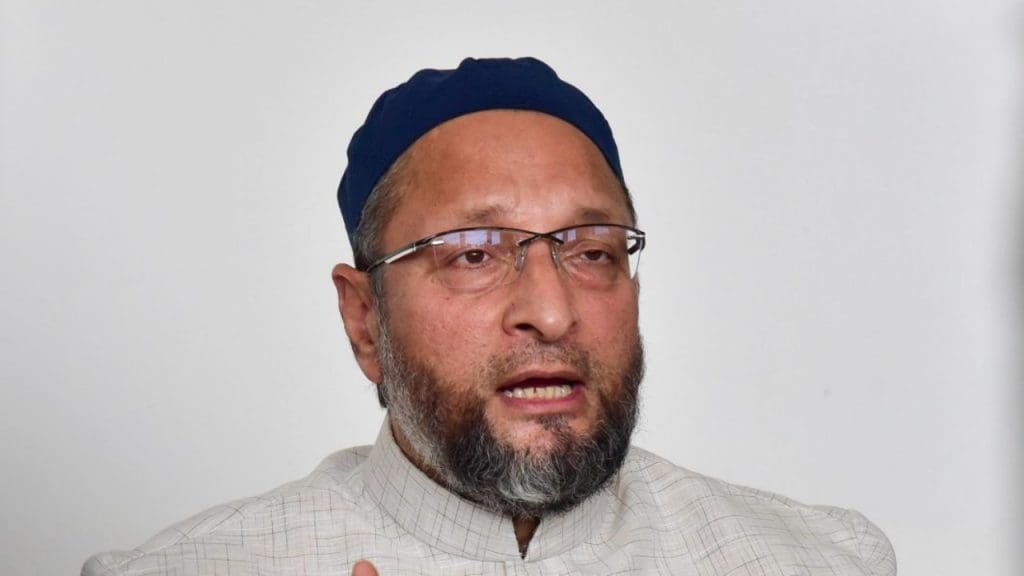
“This means that one religion has been targeted and its religious practice has been banned,” said AIMIM supremo and Hyderabad MP Asaduddin Owaisi while responding to Karnataka High Court’s Tuesday judgment, upholding hijab ban in educational institutions in the State.
“I disagree with Karnataka High Court’s judgment on hijab. It’s my right to disagree with the judgment & I hope that petitioners appeal before SC,” said Owaisi.
The Karnataka High Court on Tuesday upheld the State government order effectively banning the wearing of hijab by Muslim girl students in educational institutions in Karnataka.
“Hijab is not a part of essential religious practices of Islam and thus, is not protected under Article 25 of the Constitution,” said a three-judge Bench of Chief Justice Ritu Raj Awasthi and Justices Krishna S Dixit and JM Khazi.
Accordingly, the Court has dismissed the petitions filed by Muslim girl students, challenging the action of government PU colleges in denying their entry for wearing hijab.
Owaisi further said he hopes that not only the All India Muslim Personal Law Board but also the organisations of other religious groups appeal this judgment as it has suspended fundamental rights to freedom of religion, culture, freedom of speech and expression.
“Preamble to the Constitution says that one has LIBERTY of thought, EXPRESSION, belief faith, and WORSHIP….If it is MY belief & faith that covering my head is essential then I have a right to EXPRESS it as I deem fit. For a devout Muslim, Hijab is also an act of worship,” Owaisi said in a series of tweets.
He went on to say: “It’s time to review the essential religious practice test. For a devout person, everything is essential & for an atheist nothing is essential. For a devout Hindu Brahmin, janeu is essential but for a non-Brahmin it may not be. It is absurd that judges can decide essentiality. Not even other people of the same religion have the right to decide essentiality. It is between the individual & God. State should be allowed to interfere in religious rights only if such acts of worship harm others. Headscarf does not harm anyone.”
According to the four-time Member of Parliament, banning headscarf definitely harms devout Muslim women and their families as it prevents them from accessing education.
“The excuse being used is that uniform will ensure uniformity. How? Will kids not know who’s from a rich/poor family? Do caste names not denote background?” asks Owaisi.
His tweets read: “What does uniform do to prevent teachers from discriminating? Globally, the experience has been that reasonable accommodations are made in school, police & army uniforms to reflect diversity. When Ireland’s govt changed the rules for police uniform to allow hijab and Sikh turban, Modi govt welcomed it. So why double standards at home & abroad? Hijab and turbans of the uniform’s colours can allowed to be worn.”
“What is the consequence of all of this? First, govt created a problem where none existed. Children were wearing hijab, bangles, etc & going to school. Second, violence was instigated and counter-protests were held with saffron turbans. Are saffron turbans “essential”? Or only a “reaction” to hijab? Third, GO & HC order suspended fundamental rights. We saw media, police & admin harass hijab wearing students & even teachers. Kids have been even banned from writing exams. It’s a mass violation of civil rights. Lastly, this means that one religion has been targeted & its religious practice has been banned. Article 15 prohibits discrimination based on religion. Is this not a violation of the same? In short HC order has forced kids to choose between education & Allah’s commands,” said Owaisi.
He went on to say: “For Muslims it’s Allah’s command to be educated while also following his strictures (salah, hijab, roza, etc). Now govt is forcing girls to choose. So far judiciary has declared masjids, keeping a beard & now hijab as non-essential. What is left of free expression of beliefs?”
Hyderabad MP said that he hopes this judgment will not be used to legitimise harassment of hijab wearing women. “One can only hope and eventually be disappointed when this starts happening to hijab wearing women in banks, hospitals, public transport etc”
Muslim students in Karnataka have been protesting the ban on hijab in educational institutions, saying the Islamophobic move of the Karnataka government violates their religious freedom guaranteed under India’s constitution.
Muslim students, activists, and Opposition leaders across the country allege that these attacks on Muslim symbols and practices are part of the larger Hindutva agenda of imposing majoritarian values on the country’s 200 million Muslims.



